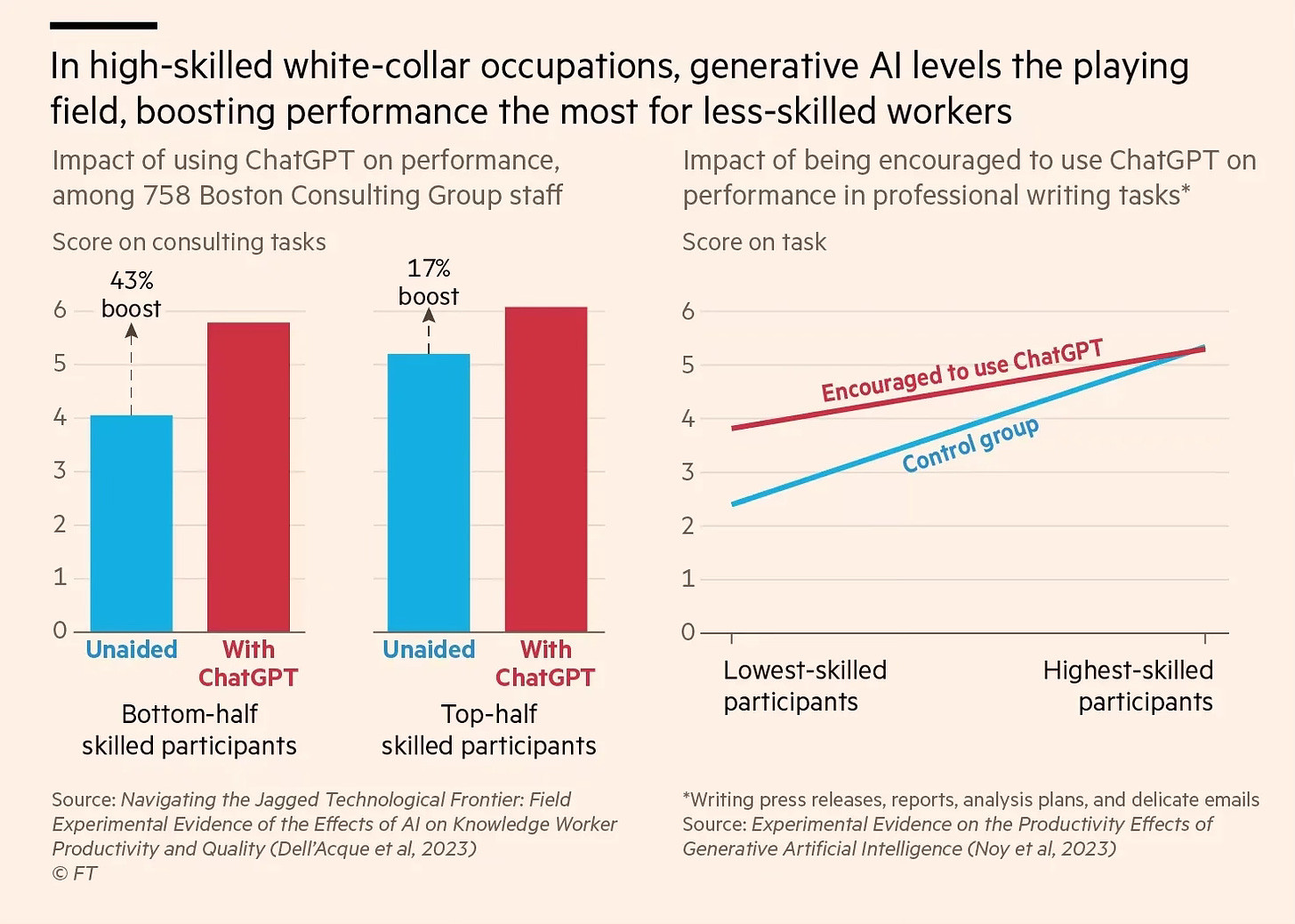AI Makes It A Lot Easier To Be A Generalist Now
Why I think a recent finding on AI and productivity has been (partially) misinterpreted
If you’ve been following AI news, you probably saw thew news about this recent MIT study which showed that ChatGPT– and presumably other tools like it– disproportionately helps the least productive workers, evening out the differences between the best and worst workers.
I’ve already seen a few hot takes predicting that this will lead to an evening-out of worker productivity, which will in turn lead to reduced wage inequality.
I don’t entirely agree. As with any study, you have to presume the results are correct until proven otherwise, but the methodology, framing and interpretation are open to scrutiny.
Participants were tested not on their overall skill or intelligence, but on a few specific tasks– “writing press releases, reports, analysis plans, and delicate emails,” as it says in that graphic. They were divided into an upper and lower half based on their performance at those particular tasks.
This leaves open the question of whether the study measure their overall worth as employees, or their skill at those particular tasks. It seems unlikely that they were all equally experienced, or equally specialized in those tasks.
Speaking from experienced: when I use ChatGPT for tasks I’m already good at, like writing meal plans or workouts, it works faster than I can, but not better than I can do when I put in my best effort.
But when I use it for something I’m not already really good at, ChatGPT not only works fast, but helps improve the quality of my work. Here are a few things I’ve used it for lately:
Giving me a refresher course on marketing tools like Crazy Egg, Hootsuite and Facebook ads, which I hadn’t used in a while, bringing me up to date on their new features.
Analyzing photos I’ve taken and providing feedback and suggestions for improvement.
Analyzing other people’s photos and telling me how they were made to look that way (both during the shoot and editing), as well as which artists, magazines and styles they’re reminiscent of
Identifying an ancient Byzantine coin
Teaching me how to build an AI-powered survey/lead magnet that takes entries into a form, turns them into a prompt for the GPT API, generates a customized plan or recommendation list for the user, and emails it to them, while also possibly putting them into a segmented mailing list
Generating content for tabletop RPG campaigns
Teach me how to edit videos with Camtasia
Coming up with gift ideas
Suggesting places around Los Angeles to take friends from out of town on outings, or do photoshoots
Test presentation slide decks by role-playing as a VC, or whoever the deck would be presented to, and asking questions as I walk ChatGPT through the deck
Learn the process of designing and making gene edits with CRISPR. Admittedly, I haven’t actually done this one yet.
ChatGPT is a sometimes-useful productivity accelerator for my usual activities, but I’ve found that it is more so useful for expanding the scope of the sorts of things I’m capable of doing. For someone who’s always been resistant to specialization, this is a godsend.
With that said, here are a few ways I can see this potentially changing the way we work in the near future.
For individual consultants like me, it lets you expand the scope of the services you offer. It’s easier now to learn to use new tools, or keep your skills up to date with tools you only use occasionally.
Similarly, for solopreneurs, it’s easier to do more things yourself instead of hiring them out.
For small teams, as with your typical tech startup, it’s now a lot easier to cover all your bases. A three-person marketing department can basically cover all the specializations, for instance. This does increase the temptation to try to do some of everything, so you have to be careful about that.
For larger companies, training people to generalize a little more can help solve the siloing problem. That is, you can more easily organize your company around product/service/brand verticals, instead of by function.
AI tools make it easy to learn something new and add to your skillset. In fact, this may actually be a better use than having them do things for you altogether.
I don’t have a pithy conclusion here, other than the usual “try it out and see for yourself,” but I’m curious to know what creative tasks other people have used ChatGPT and similar tools for. Drop your stories in the comments.




